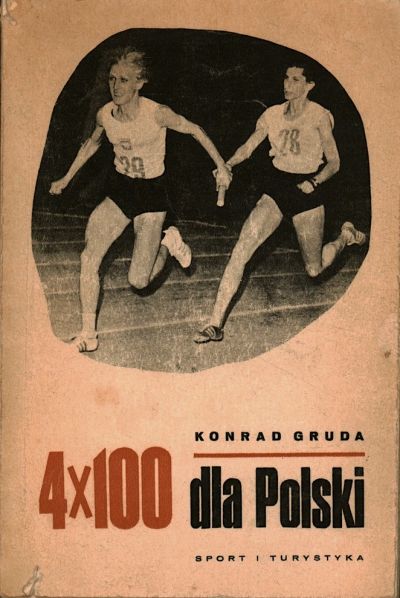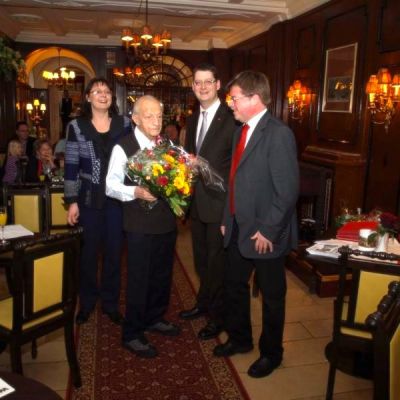Flexible in all systems. The many lives of Konrad Gruda

Career under the communist regime. Rise and fall
In mid-May 1945, Gruda was made voivode commander of the citizens’ militia of Kraków[15]. He remained in this role, at the same rank as a captain[16], until 1946, when proceedings were opened against him due to “permitting an abuse of power”[17]. At the request of the association of invalids, and without having a legal basis for doing so, he had withdrawn ownership of a kiosk from a woman suspected of having appropriated the shop illegally. The lawsuit was crushed. Further investigations followed into the alleged unauthorised assumption and abuse of authority. It was claimed that within a short period of time, he had written off several cars and made money off formerly Jewish property that now belonged to the state[18]. As a result, from 5 November 1946, Gruda was given a new post as commander of the citizens’ militia in Otwock, in the Warsaw voivodeship[19]. In Kraków, he witnessed the pogrom against the Jews on 11 August 1945[20]. The anti-communist resistance was unsure what his position on the matter was. On the one hand, he had given the order to arrest Jews who were attempting to flee. On the other hand, he ordered the arrest of provocateurs and criminals[21]. He later gave witness statements at the trial against those involved in the pogrom. That same year, he married Zofia Winnicka-Bieżeńska (b. 1920) from Drohobycz.
In 1946, Gruda received the Golden Cross of Merit[22], among other honours awarded until the end of the 1940s. In Stalinist Poland, he contributed to the creation of a socialist sports movement[23]. In the local assessments of the Freedom and Independence (Wolność i Niezawisłość) underground organisation, which was not exactly well known for being friendly towards the Jews, he was initially rated positively. However, it was soon rumoured that he had received his training at the NKVD espionage school in Moscow[24].
From August 1947 onwards, the special division of the supreme command of the citizens’ militia in Warsaw conducted investigations into Gruda. He was accused of financial misconduct and having a positive attitude towards elements that were hostile towards the system[25].
On 30 July 1949 (backdated to 1 March 1949), Gruda was dismissed from the citizens’ militia and assigned to the reservists[26]. Two years later, presumably following numerous attempts by Gruda to obtain information and requests for rehabilitation, the Ministry for Public Security justified its decision by claiming that while he was “highly skilled”, he had ultimately underperformed and had committed a series of offences for personal gain[27]. Internally, the assessment was more severe: “Inappropriate behaviour towards his subordinates and an immoral lifestyle.”[28] In the report previously presented by the supreme commander of the citizens’ militia, General Józef Konarzewski, to the minister responsible, Stanisław Radkiewicz, Gruda’s transgressions during the four post-war years in Kraków and Otwock were outlined in detail in a 13-point list[29]. Gruda had largely denied the allegations and claimed that others had been responsible for the misdemeanours. However, the authorities were not convinced by his arguments[30].
From 1950 to 1956, he made an apartment that he rented in Warsaw under the codename “Inwalida” available to the state security organs for clandestine meetings and similar activities (właściciel LK)[31]. The historian Ryszard Nazarewicz (1921–2008), who at that time was a major in Division V of the Ministry for State Security (Ministerstwo Bezpieczeństwa Publicznego) had hired him as agent-informator[32]. One of his advocates was the deputy director of Division III, Leon Andrzejewski, whom he knew from the Kościuszko division[33].
[15] IPN BU 00/698/1010/1, p. 17. – The information provided by Adam Patla, Euforie witających, tragedie entuzjastów. Wspomnienia z lat 1945–1965 [unpublished manuscript], https://sbc.org.pl/dlibra/publication/637935/edition/600263 (last accessed on 14/2/2025), p. 19, that Gruda was already named commander on 23 January 1945 is incorrect.
[16] IPN BU 00/698/1010/1, p. 12.
[17] IPN Kr 111/415.
[18] See also various witness statements in IPN BU 00/698/1010/5.
[19] IPN BU 00/698/1010/1, p. 19.
[20] Julian Kwiek: Pogrom antyżydowski w Krakowie 11 sierpnia 1945 r., in: Pogromy Żydów na ziemiach polskich w XIX i XX wieku. T. 4, Holokaust i powojnie (1939–1946), Warszawa 2019, p. 161–181, here p. 170.
[21] Julian Kwiek: Żydzi, Łemkowie, Słowacy w województwie krakowskim w latach 19451949/50, Kraków 1998, p. 31–45, here p. 34.
[22] https://isap.sejm.gov.pl/isap.nsf/download.xsp/WMP19470230050/O/M19470050.pdf (last accessed on 14/2/2025).
[23] Konrad Gruda: Po pięciu latach, in: Wychowanie Fizyczne 3 (1949), no. 7, p. 3–6.
[24] ANKr, WiN 4, k. 433, quoted from Joanna Tokarska-Bakir: Cursed. A Social Portrait of the Kielce Pogrom, Ithaca/London 2023, p. 131. This also contains the reference to Gruda’s personnel file in the IPN archives: IPN BU 2174/2138.
[25] IPN BU 00/698/1010/6, p. 2.
[26] IPN BU 2174/2138, p. 22.
[27] IPN BU 2174/2138, p. 23.
[28] IPN BU 00/945/559-1, p. 63 (notes from 26/4/1952).
[29] IPN BU 00/945/559-1, p. 66–72. The allegations against Gruda included alcoholism, causing numerous accidents, arbitrary arrests and releases from prison within his area of responsibility, illegal dealings, including pillage (szabrownictwo) in the former German regions and in Kraków, and neglect of his official duties. An analysis of Gruda’s business and “sports promotion” activities would go beyond the remit of this article, but would be extremely interesting as a historical account of everyday life. The allegations were embellished with political arguments, such as the employment of a Hungarian who had fought against the Soviet Union, friendships with former soldiers of the Home Army and preferential treatment given to German women whose companionship he sought (IPN BU 00/698/1010/8, p. 29–31).
[30] Letter by Gruda to Minister Radkiewicz dated 20/6/1949 (IPN BU 00/698/1010/9, p. 6–24). – Comment on Gruda’s statements in a letter from Konarzewski and the head of the special division, Piątkowski, to Minister Radkiewicz, dated 5/7/1949 (IPN BU 00/698/1010/9, p. 4–5). See also the record of Gruda’s examination on 12/4/1949 (IPN BU 00/698/1010/8, p. 15–20).
[31] IPN BU 00/945/559-1, Notatka z dn. 21/10/1974. – Ibid., also declaration of obligation (p. 12).
[32] Before 1953, this term did not denote a more precise definition of the nature of the cooperation, see also https://pl.wikipedia.org/wiki/Osobowe_źródło_informacji (last accessed on 14/2/2025).
[33] Andrzejewski, who was also of Jewish origin, was married to the writer and Auschwitz survivor Krystyna Żywulska, who later lived in Düsseldorf.




![Konrad Gruda: Zwölf Uhr einundvierzig. Wird Jan der tödlichen Gefahr entrinnen?, München 1979 [1975] Konrad Gruda: Zwölf Uhr einundvierzig. Wird Jan der tödlichen Gefahr entrinnen?, München 1979 [1975] - Book cover](/sites/default/files/styles/width_100_tiles/public/assets/images/Konrad%20Gruda_Zwo%CC%88lf%20Uhr%20einundvierzig.%20Wird-Jan-der-to%CC%88dlichen-Gefahr-entrinnen.jpg?itok=z9Cru2Qk)




